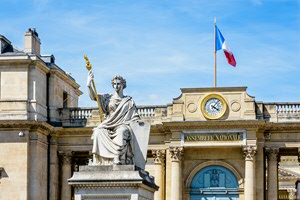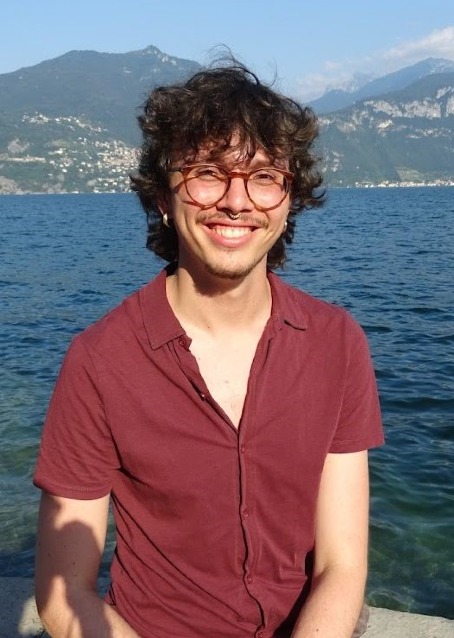Frans studeren binnen Europese talen en culturen
| Let op: Vwo-eindexamen Frans is verplicht om toegelaten te kunnen worden voor Frans als majortaal. |

Frankrijk heeft een grote culturele, politieke en historische invloed gehad in de westerse wereld. De revolutie van 1789 stond aan de wieg van de moderne parlementaire democratieën. Frankrijk speelt nog steeds een belangrijke rol in Europa. Daarom zijn er altijd mensen nodig die de Franse taal en cultuur heel goed kennen en begrijpen.
Frankrijk is traditioneel een van de belangrijkste vakantiebestemmingen van Nederlanders. Er zijn ook minder opvallende, maar toch nauwe banden met Frankrijk. Die stammen vaak nog uit het verleden, zoals onze taal, die zeer door het Frans is beïnvloed. Denk bijvoorbeeld aan woorden als bureau, affaire, paraplu, dressoir en étage. Franse schrijvers en schilders zijn een belangrijk referentiekader geweest voor onze cultuur, net als Franse filosofen, zoals Elisabeth Badinter, Simone de Beauvoir, Jean-Jacques Rousseau, Jean-Paul Sartre en Voltaire. De Franse Revolutie heeft Europese samenlevingen ingrijpend veranderd. En tot op de dag van vandaag speelt Frankrijk, samen met Duitsland, nog een internationale hoofdrol als belangrijkste machtsfactor in de Europese Unie.

Waarom Frans?
Dit soort taal-, historische, culturele en politieke kwesties kunnen allemaal aanleiding zijn om voor Frans te kiezen. Maar het allerbelangrijkste is dat je je werkelijk voor die taal interesseert. In Groningen richt je je met de specialisatie Frans binnen Europese talen en culturen op de Franse taal en cultuur, en daarnaast op Europa. Soms trek je zelfs verder de wereld in. Zo behandelen we bijvoorbeeld in Frans specifieke taalkunde colleges de diversiteit van de Franse taal en door te kijken naar Francofonie, de aanwezigheid en het gebruik van Frans over de hele wereld. Taal speelt een belangrijke rol in de culturele en politieke identiteit, zoals bijvoorbeeld in de regio Québec. Ooit mislukten er zelfs twee serieuze pogingen om Québec onafhankelijk te maken van Canada. Dankzij inleidende colleges Taal en Maatschappij, die je met andere studenten Europese talen en culturen hebt gevolgd, kun je het hoe en waarom van dat soort processen veel beter begrijpen en analyseren.
Europese talen en culturen met Frans is een studie waarmee je vloeiend Frans leert spreken en schrijven en je je ontwikkelt tot een academisch geschoold kenner van de Franse taal en cultuur binnen de Europese context. Je taalvaardigheid zal enorm vooruitgaan tijdens je verblijf in het buitenland in het derde jaar. De universiteit beschikt daarvoor over contacten met universiteiten in België, Frankrijk en Canada.

Door Franse taal en cultuur te studeren ontwikkel je essentiele vaardigheden die je voorbereiden op banen in allerlei verschillende velden. Natuurlijk kun je ervoor kiezen docent te worden in het voortgezet onderwijs. Of voor een carrière binnen Europese instellingen of het bedrijfsleven. Je kunt terechtkomen bij financiële instellingen of de Nederlandse ambassade in landen waar Frans de officiële taal is, maar ook in de toeristische sector. Veel hangt af van je minor en het profiel dat je kiest.

'De focus is op hoe de Franse taal in de praktijk wordt gebruikt, in plaats van het afgezaagde leerboek-Frans'
Sinds ik begon met Frans op de middelbare school, heb ik een affiniteit met en fascinatie voor de taal gehad. Ik vermoed dat dit veel te maken met de geweldige culturele geschiedenis van de taal. Frankrijk heeft een aantal van de meest iconische kunstenaars, scrhijvers, filosofen geproduceerd wiens werken allen een bepaalde essentie hebben, die voor mij onmiskenbaar Frans is. Als een gevolg van deze voorliefde werd het mijn wens om zo veel mogelijk te weten te komen over dit culturele landschap door het beheersen van de Franse taal en de omringende cultuur. Nu ik deze cursus heb afgerond, kan ik zeggen dat Frans studeren binnen Europese Talen en Culturen me de kans heeft gegeven om dit doel te behalen, en zelfs nog verder te gaan. Omdat de cursus ingaat op verschillende aspecten van Frankrijk, heb ik mijn begrip van het land als geheel kunnen verbreden. Nu heb ik niet alleen kennis opgedaan over de cultuur, maar ook over de verschillende maatschappelijke en politieke aspecten. Bovendien is de focus op hoe de Franse taal in de praktijk wordt gebruikt, in plaats van het afgezaagde leerboek-Frans, wat deze cursus echt onderscheidt van andere lesmethoden. Degenen die de traditionele taalstudies zijn gaan vrezen, zullen waarschijnlijk aangenaam verrast zijn door de radicaal andere invalshoek van Frans aan de RUG; in plaats van voorrang te geven aan vervelende grammaticaregels en eindeloze woordenlijsten, stelt deze cursus een praktijkgerichte aanpak voor waarbij studenten de taal verwerven door praktisch gebruik. In plaats van les te krijgen over de passé composé, kun je deelnemen aan debatten of zelfs een typisch Frans product ontwikkelen. Voor mij maakte dit de cursus boeiender en interessanter, omdat het me in staat stelde de taal te leren en tegelijkertijd de Franse cultuur en samenleving te ontcijferen.
Terug naar Europese talen en culturen.
| Laatst gewijzigd: | 26 maart 2025 11:50 |
